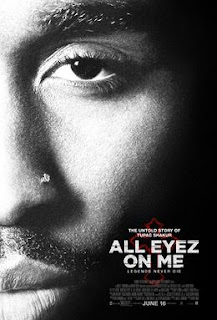I just got back, a few hours ago, from watching “All Eyez on Me,” a movie about the life and death of Tupac Shakur. In many ways, the movie traces the struggles, conflicts, contradictions, and decline of the African American community from the early 1970s until the mid-1990s.
Shakur, in this movie, was a tragic hero whose background, which was a quintessentially American hybrid of Afrocentric nationalism and Shakespearean city theater, gave him a vision of what he should aspire to while also sowing the seeds of his destruction.
The struggle against oppression and the attempt to adhere to principle comes at a heavy cost, as both Tupac and his mother learned over the arc of their lives. Tupac’s rise to stardom occurred within the tension of one who sees himself as being someone who has the power to spark the rise of a liberating form of self-awareness and to raise the consciousness of African American communities, and, on the other hand, one who sees himself as being merely an entertainer whose primary goal is to sell more records.
In the 1992 movie “Juice”, Tupac played the role of "Bishop," who was a chilling sociopath. The image worked for him and he may have internalized the persona. Still, this image was at odds with the values that his mother tried to instill in him since childhood.
Tupac's struggle with becoming something that he wasn't, while claiming he was expressing what was inside of him all along, became a recurring theme. On some level, the sociopath character, Bishop, channeled Tupac's childhood anger and gave it a creative outlet. The internal struggle that was emerging is foreshadowed in "All Eyez on Me" when Tupac's stepfather says to him, “Sometimes people need to step out of who they are to realize what they can be.”
In the film, Shakur tried to rationalize his misogynist outlaw popular image, which boosted him to stardom, with his grounding in the mixture of the Gospel and Islamic sensibilities of African American culture and spirituality: a spirituality of suffering, redemption, and resilience. It is a spirituality of survival.
Again, and again, however, he found himself making deals with the devil in order to rise to the top of his game, and in order to survive, when the authorities and his contemporaries were trying to destroy him.
The influence he had on several generations of young black males came at the cost of the corruption of his ideals. He reconciled the conflict between his image and his ideas by saying, “You’ve got to enter into somebody’s world in order to lead them out of it.”
When he was finally sitting on top of the kingdom of rap, at such great cost to his core values, it wouldn’t be a surprise to discover that he was thinking, like Shakespeare’s Henry IV, “Uneasy lies the head that wears the crown.”
Tupac is depicted in the film as a man with a message, although, at 25, with all of the seductions of self-indulgence at his fingertips, the messenger often lost his way.
Nonetheless, the importance of the message remained. During one scene in the movie a record company executive told him that his lyrics were too raw and that people just wanted to be entertained, Tupac replied, “Some people just want to be entertained; other people want a chance to speak. I’m reporting from the streets. I’m educating and keeping it real.”
The sample of hip hop from the early 1990s, especially from Tupac’s long-forgotten Digital Underground days, had me dancing in my seat. Funny how all of that comes back to you with irresistible force when you haven’t heard the music for 25 years.
The film, like Tupac’s life, touched base with locations that were significant for very different reasons and in very different ways, for African American culture in the ‘70s through the ‘90s: Harlem, Baltimore, The San Francisco Bay Area, Brooklyn, and Compton.
All Eyez on me captures the best and worst of the struggle for survival in African American communities. It also captured the hyper-materialist popular culture of the 1990s. Tupac grew up believing, with good reason, that the biggest threat to his survival came from forces beyond African American communities; by the end of the film, he realized that the community is often complicit in its own destruction.
This is not to say that the external threats weren't real. When Tupac’s mother realized that powerful people saw what an influence he had over young people, and perceived him as a threat, she pleaded with him to be careful: “They are going come after you with everything that you love. They are going to give you the tools that you need to destroy yourself.”
The movie presents an all-too-human story of the contradiction between the best and the worst that is inside of us.

No comments:
Post a Comment